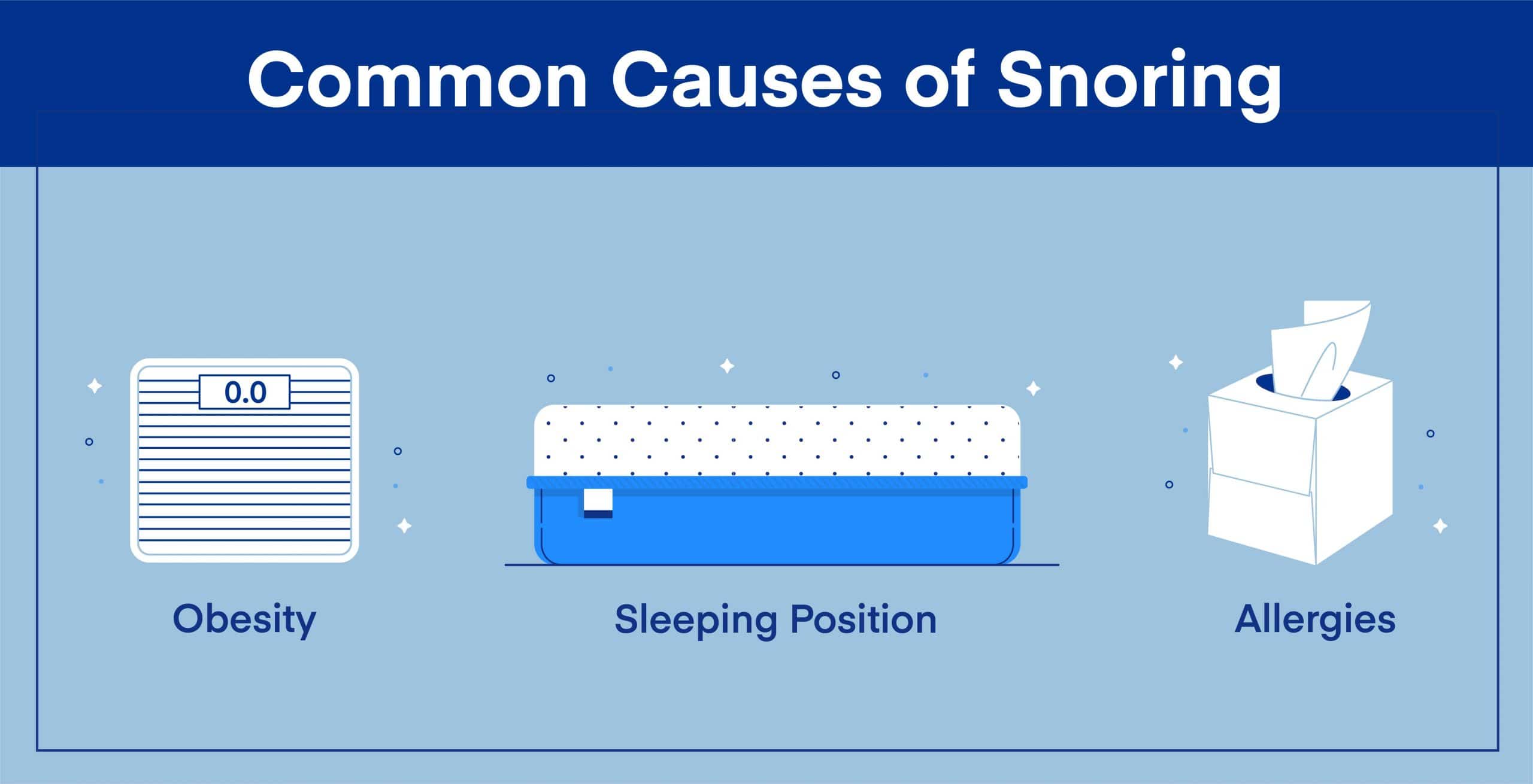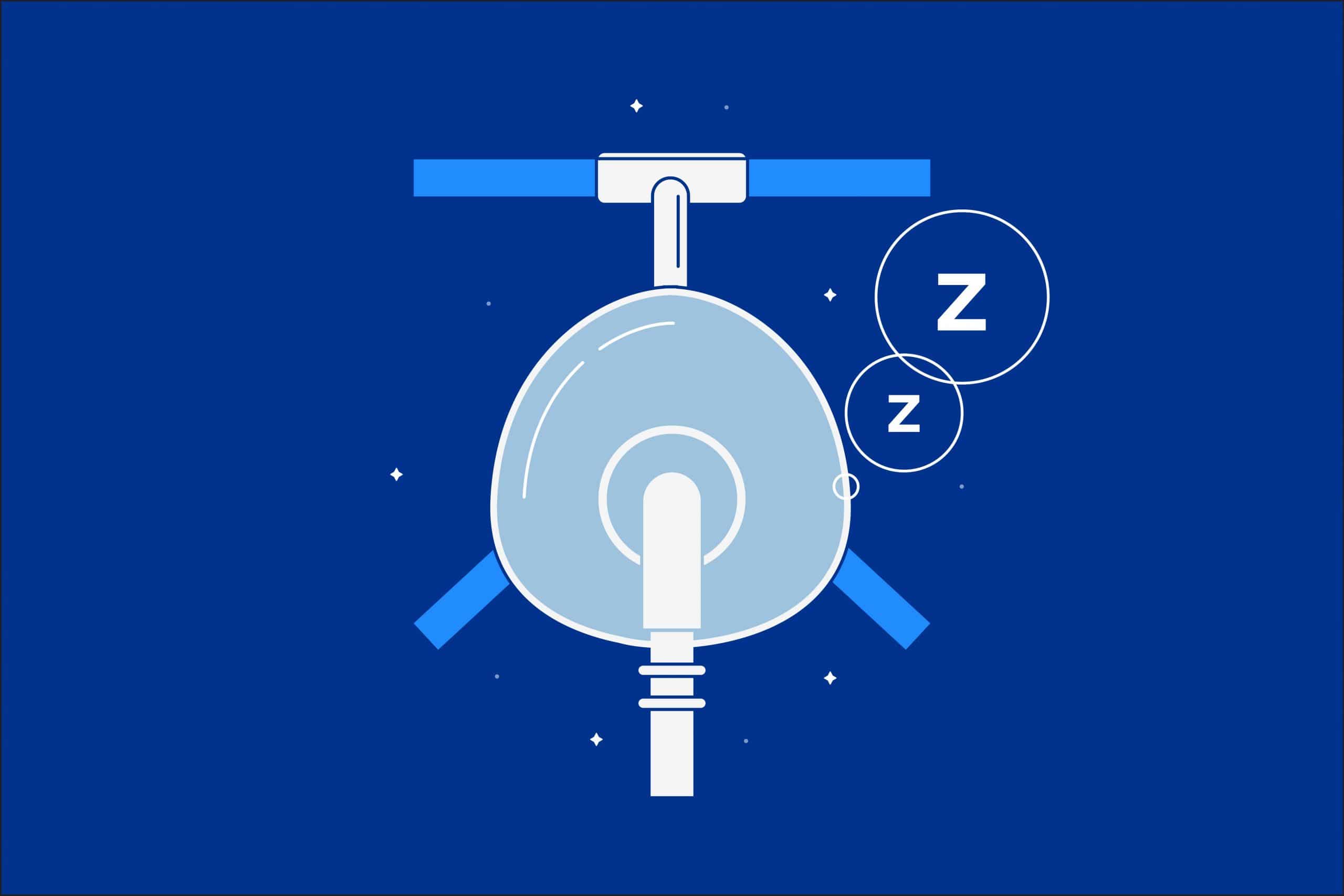Snoring is caused by respiratory vibrations during sleep and may indicate underlying health problems. However, not all snorers are at risk of being diagnosed with another medical condition because the cause could be as simple as a faulty sleep position or sleep deprivation.
Snoring is common in the general population, with up to 25% of women and 45% of men Verified Source National Library of Medicine (NIH) World’s largest medical library, making biomedical data and information more accessible. View source reporting habitual snoring. If you suffer from snoring, this article can help you identify a possible cause, treat the issue, and potentially avoid developing more serious health issues.
Why Do People Snore?
Snoring refers to the sound made by relaxed soft tissue in the throat while sleeping. People snore when air passing through the nose and throat is obstructed by the soft palate of the throat, causing vibrations that produce a loud sound.
How Snoring Disrupts Sleep
According to a National Library of Medicine study Verified Source National Library of Medicine (NIH) World’s largest medical library, making biomedical data and information more accessible. View source examining how snoring affects sleep, researchers found that snorers and their sleep partners suffered from daytime sleepiness and low-quality sleep at night. Not getting enough sleep may lead to more serious issues, such as depression, anxiety, extreme weight loss or gain, and even heart issues down the road.
Common Causes of Snoring

Snoring can be caused by environmental, lifestyle, and physiological factors, as well as pre-existing medical conditions.
Environmental Factors
Sometimes an increased intensity of snoring may be caused by a change in your environment, such as a dry climate or allergies.
Dry Climate
Dry air carries allergens in it, stimulating your body to produce more mucus for filtering out the allergens. Excess mucus may lead to nasal congestion, which triggers snoring. Using a humidifier filters the air and prevents the allergens from entering your nasal passage.
Allergies
Allergies lead to symptoms like a runny nose and itchy throat. This inflammation constricts the air passage, making it difficult for air to pass through smoothly.
Lifestyle Factors
Increased intensity and frequency of snoring may be caused by your lifestyle. Factors like sleep deprivation, sleeping position, medications, obesity, and aging may aggravate snoring.
Sleep Deprivation
Frequent snoring can cause you to wake up frequently in the night, even if you don’t remember it. The constant waking leads to fatigue and other symptoms of sleep deprivation. This means you’re most likely spending less time in slow-wave sleep, which your body needs to recover from the day.
Sleeping Position
Lying in the supine position is known to trigger snores, which often stops when you change positions. When you sleep on your back, your throat muscles relax and block your airway. To avoid snoring, we recommend sleeping on your side.
Medications
Some medications may cause the muscle tone in your throat to relax. Additionally, some sleep medications can cause snoring.
Obesity
Excessive weight gain often creates fatty tissue deposits around the neck and throat region. When you lie down, these fatty tissues may cause the muscles in your throat region to collapse.
Aging
With age, our tissues and skin tend to lose moisture and elasticity. This loss of tone can make the tissues more prone to congestion.
Physiological Factors
Sometimes physiological factors in the upper airway such as a long tongue, enlarged tonsils, deviated septum, soft chin or a long uvula may lead to snoring.
Underlying Medical Conditions
When you have an underlying medical condition, you tend to snore more frequently and with increased intensity. Factors like a cold or sleep apnea may be the reason behind your snoring.
Cold and Sinus
When you are affected with a condition which blocks your air passage, you are bound to snore more at night. Blockage in the nasal passage makes it difficult to breathe.
Obstructive Sleep Apnea (OSA)
Obstructive sleep apnea is a medical condition causing your throat muscles to relax when you sleep, making it difficult to breathe. If you have OSA, you may wake up choking or gasping. Usually, all OSA patients manifest snoring as a symptom, but not all snorers have OSA.
FAQs
Do men snore more than women?
Men are born with air passages narrower than women; as such, they are more likely to snore. The narrower the passage, the harder it is for air to pass through smoothly, resulting in loud snores.
Is snoring bad?
Snoring is not as harmful as other sleep issues, but it can still hinder a good night’s sleep. If you suffer from snoring, you can implement some lifestyle changes such as changing sleep positions, losing weight, using adjustable beds, or trying out nasal strips.
Why Persistent Snoring Should be Assessed by a Doctor
With increased awareness about the causes of snoring, we recommend consulting a doctor if your snoring is consistently disrupting your sleep. If your snoring does not reduce in frequency or intensity despite changes in lifestyle, it is better to get assessed by a doctor.
About the author
Geoff McKinnen is a writer focusing mainly on the healthcare industry and has written articles on everything from foods to help you lose weight to the connection between Alzheimer’s and sleep. Geoff’s passionate about helping readers improve their well-being to lead happier lives. Outside of work, Geoff enjoys cycling and hiking and believes that by leading a healthy lifestyle, he can help others do the same.
View all posts




